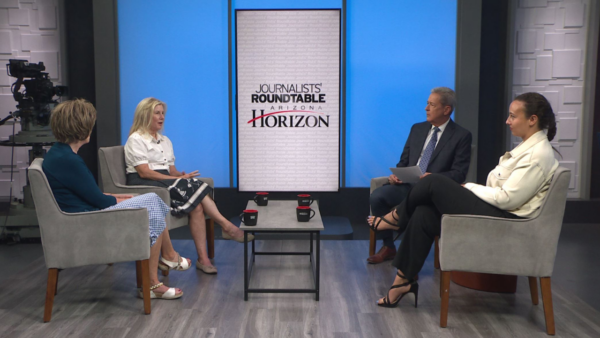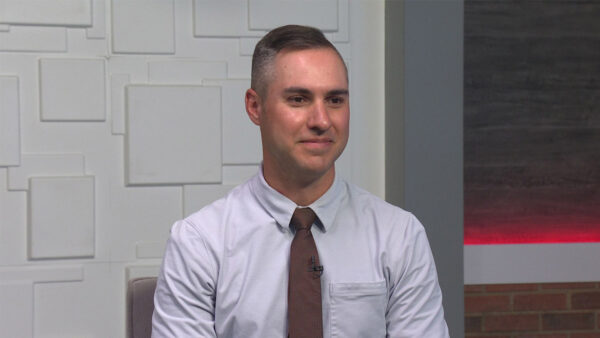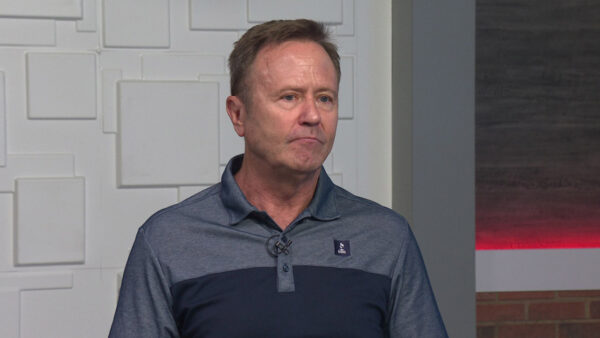Tucson-area company Ridgetop has won two $1 million contracts from the U.S. Department of Energy to develop special computer chips hardened by radioactivity. The analog-to-digital signal processor chips will be used in particle accelerators. Doug Goodman, Ridgetop’s Founder and CEO, will discuss his company’s chips.
Ted Simons: Tonight in our continuing coverage of Arizona technology and innovation we look at Ridgetop, a Marana based company working with the U.S. Department of Energy to produce radiation hardened computer chips to be used in particle accelerators similar to the one that discovered the Higgs-Boson. Here to talk about his company's work is Doug Goodman, Ridgetop's founder and CEO. Good to have you here.
Doug Goodman: thanks very much.
Ted Simons: Couple of million dollar contracts from the Department of Energy for what?
Doug Goodman: What we do is the problem is to convert analog sensor data to digital form. So it can be processed and the artifacts that Dr. Krause was talking about can be extracted. We convert analog to digital and we have to do it in a way that is radiation hardened, which means that incident radiation will tend to degrade electronics, semi conductors in general. What we have to do is apply mitigation measures to make sure that the chip we make doesn't degrade. It retains its measurement accuracy, its dynamic range, linearity. All these specifications are preserved in the presence of radiation.
Ted Simons: This is the kind of thing you wouldn't need for run of the mill, every day computer chip operations, but when you're talking about a particle accelerator, medical devices, you need this kind of protection.
Doug Goodman: that's correct. Space electronics. One of the issues in space is that once you get outside the earth's atmosphere the magnetosphere protects us. It shields the terrestrial component. What we have is a way of hardening these chips when they are used in critical environments. If you have a cell phone or tablet it's not as critical as it is in a system that is used for magnetic resonance imaging or have a system on the large Hadron collider or in space electronics. It really requires additional attention. But the interesting thing is that as process geometries have gotten smaller and smaller it's open up the opportunity to make things faster and faster conversion speed. To get the degree of fidelity they need to look at these arcane collisions that occur requires that we get the measurement very, very close to where the collisions occur, which increases radiation and preserve the speed, the linearity, all these kinds of specks that come into it.
Ted Simons: Basically they did digital at a faster speed and protecting not only the information but the chips themselves.
Doug Goodman: That's correct. It stems from the chips themselves are populate circuit boards and the circuit boards go on racks. If you look at the large Hadron collider or any of these, they are immense in size. They have to make these precise measurements. A lot of the types of collisions are rare and hard to capture. Extremely sensitive electronics. That's what Ridgetop provides. We actually got started by looking at physics failure of these devices when we started the company 12 years ago. We collaborated closely with Arizona State University with researchers over there. It's wonderful to work with ASU and the people there and kick around ideas and find ways to make electronics more robust.
Ted Simons: That relationship is develop, correct? You're heading out toward Polytech now to…
Doug Goodman: At this time I'm very impressed with what ASU has done over the years in growing the micro electronics component which is the world we live in at Ridgetop, but the group that we're dealing with primarily is in Tempe. There's a lot of expansion plans out in east County. We're opening a design center in Mesa for Ridgetop. We're actively hiring mixed signal engineers, digital to analog or analog to digital. We have a lot of growth plans for east County.
Ted Simons: we were talking about before we got into the contracts and the whole idea of data to Department of Education tall, there was, I guess there still is, a canary in the coal mine aspect to what your company does. Are you basically stamping shelf life on to computer chips and certain sensitive electronic information?
Doug Goodman: In the case of what we call prognostic canaries it allows us to credit received structures on the chip. It will give you early warning of an impending failure. This is really important if you're in an avionics or aircraft situation where you want to switch to a backup system quickly and seamlessly or more recently what's happened in prognotics is what you hear about on Wall Street, millisecond level trades, at the speed of trading securities, there was a meltdown in the Tokyo stock exchange recently. All these kinds of things where electronics are getting pushed into areas that they didn't exist before. They are being taxed, being pushed. There's high power dissipation. There's heat, there's performance parameters. All these things can drift and change with time. What Ridgetop has done is we have worked very hard with our research staff to categorize the types of failures and types of degradation metrics and create specialized structures that provide just what you said.
Ted Simons: These are literally built in signals.
Doug Goodman: That's correct.
Ted Simons: in these instruments.
Doug Goodman: That's right. You can apply prognostics in a general sense. We have a five-level model where you start with a dye level like with the collider particle accelerator. There's a package level, there's board level, module level, up to system level. There's signatures that you can extract that indicate the degradation that's going to happen on the system, whatever you've targeted. Each of those five levels. As a company we started at the dye level where people were saying these semi conductors don't have a 60-year life any more. It's down to less than ten, less than eight. It's getting to the point where there's irreversible damage that occurs. People with cellphones shouldn't worry because there's a refresh every year or two on those. But in critical systems it's absolutely critical that when people are putting electronic control systems in harsh environments that they are aware of these things and Ridgetop provides that.
Ted Simons: Almost sounds like the reverse of Moore's law. The chips are becoming less and less lengthy in duration.
Doug Goodman: yes. So there's a corresponding thing a lot of people don't talk about. People do talk about Moore's law getting smaller and smaller, channel lengths down to 20 in animators, down in the Nano range. What happens then is there's a corresponding increase in the kinds of damaging effects that can crop up. People, system designers that are going to use these chips really have to understand what they are doing in that area, what the vulnerabilities are. We have also created at Ridgetop instruments that allow people to do some of that testing themselves. So we're working with a lot of people in the commercial sector saying, okay, it answers the question, how long will this chip live? That's really what it comes down to.
Ted Simons: Well, it's interesting stuff. Congratulations on your success down there and good luck in future endeavors. Good to have you on. Thanks for joining us.
Doug Goodman: Thank you.
Ted Simons: That is it for now. I'm Ted Simons. Thank you so much for joining us. You have a great evening.
Doug Goodman:Founder and CEO, Ridgetop;























